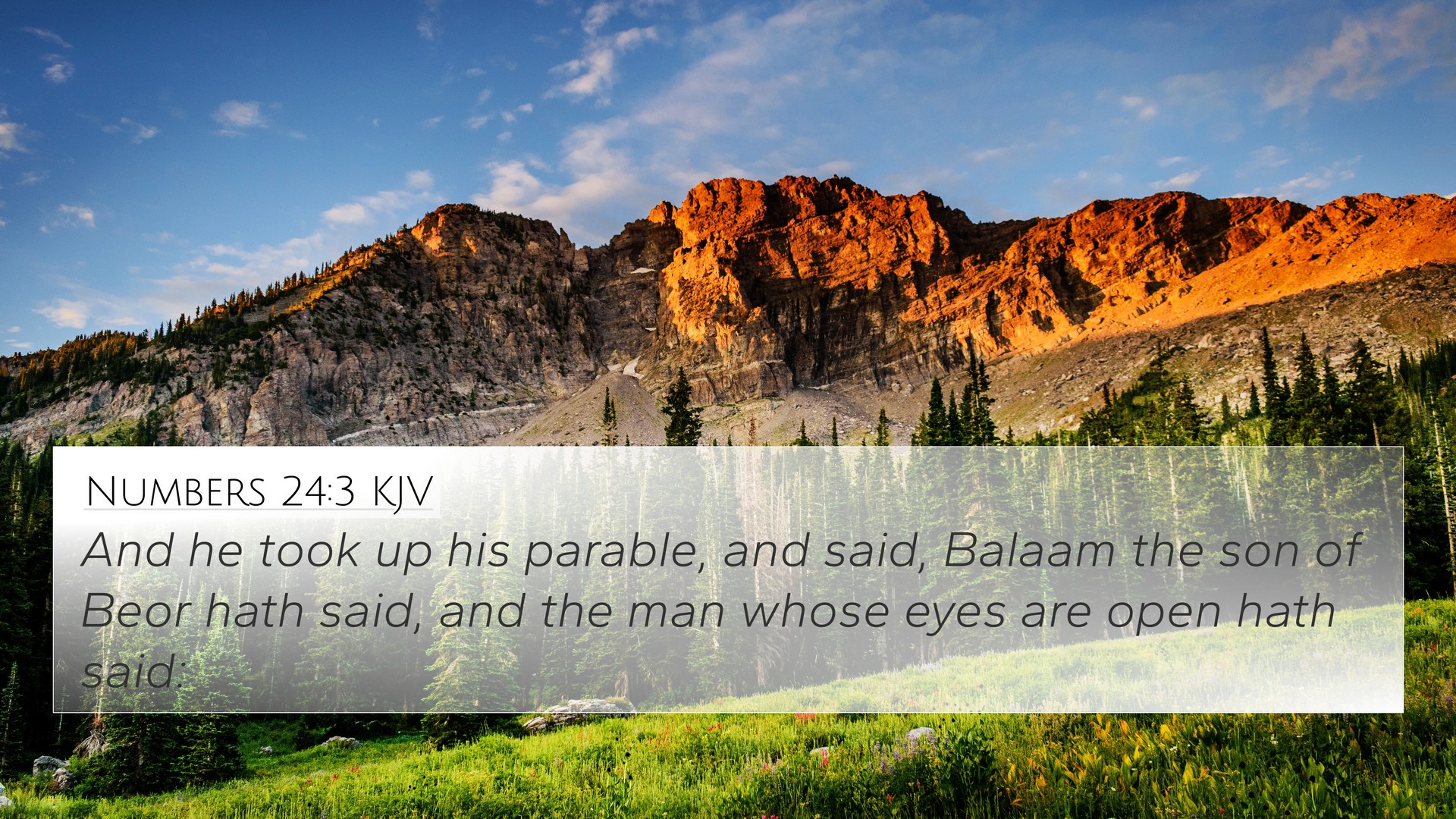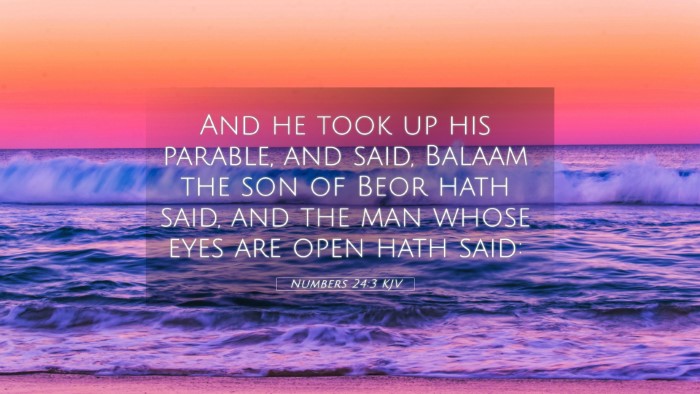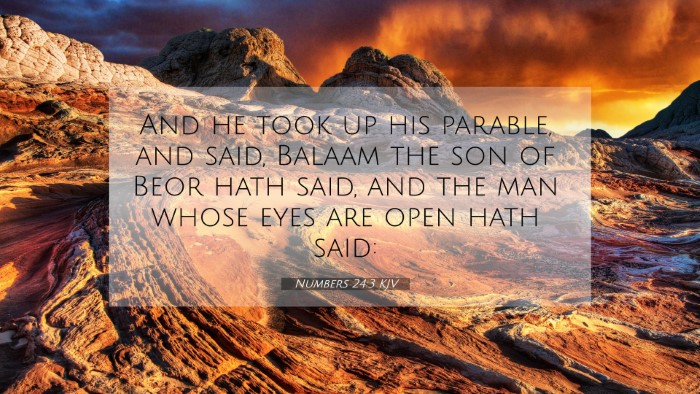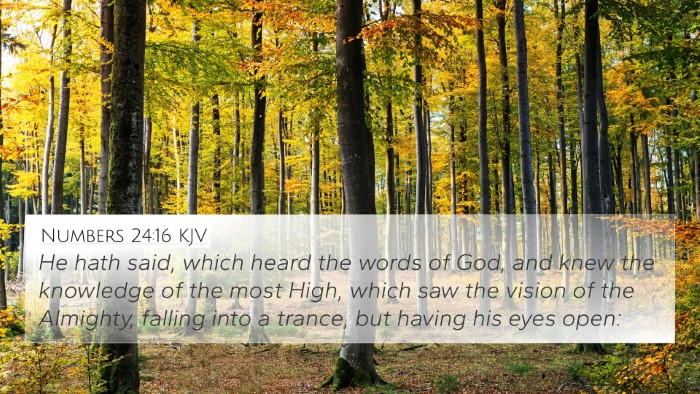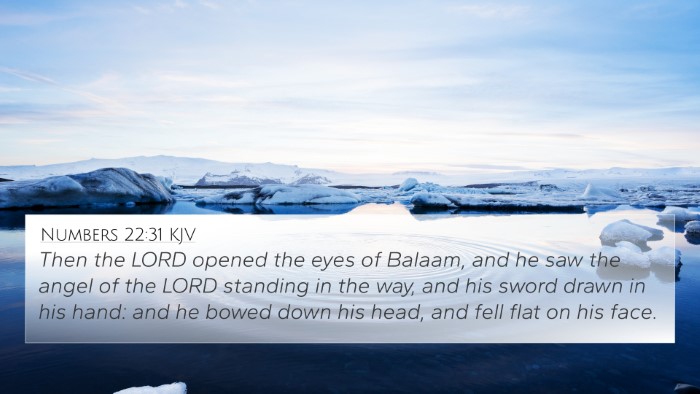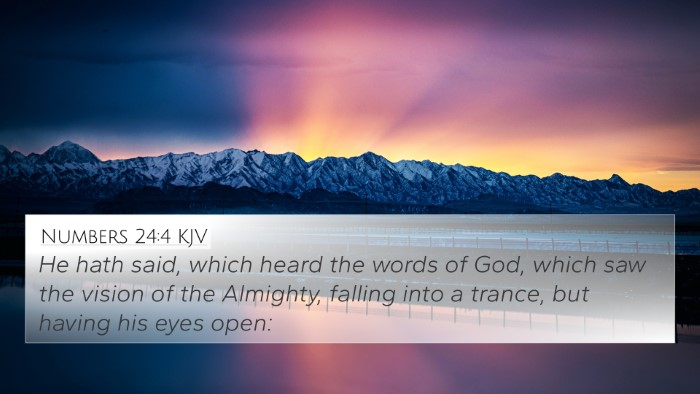Understanding Numbers 24:3
Verse Reference: Numbers 24:3
"And he took up his parable, and said, Balak the king of Moab hath brought me from Aram, out of the mountains of the east, saying, Come, curse me Jacob, and come, defy Israel."
Summary of Meaning
This verse presents the context of Balaam’s prophecy, illustrating the tension between Israel and Moab and the divine purpose that is unfolding. The phrase "he took up his parable" indicates Balaam’s role as a prophet speaking on behalf of God, showing that he had a clear understanding of his divine mission despite the intentions of others.
Key Insights:
- Divine Commission: Balaam was called by King Balak to curse the Israelites, yet he emphasizes that his words will be dictated by God, demonstrating that divine will supersedes human desire.
- Spiritual Authority: The reference to Balaam's origins from Aram highlights his status as a prophet with authority, further emphasized by the way he addresses the Israelites.
- Conflict of Interests: The actions of Balak depict humanity's attempt to oppose God's chosen people, as Balak’s intentions clearly clash with God’s plan for Israel.
Commentary Insights
Matthew Henry's Commentary
Henry notes that Balaam's prophetic declaration showcases the futility of opposing God’s will. He emphasizes the significance of the statement as it reveals God’s favor towards Israel, which made any attempt by Balak to curse impossible.
Albert Barnes's Notes
Barnes explains Balaam’s action of elevating the importance of his work, suggesting that Balaam possibly understood the risk of defying the covenant people. His prophecy was meant to inspire awe and reverence for God’s supremacy over the nations.
Adam Clarke's Commentary
Clarke focuses on the structural aspects of the verse, highlighting the terminology used by Balaam. He notes how Balaam emphasizes the origin of his commission, framing it within the larger narrative of Israel's journey and God’s promises to them.
Cross-References
This verse has significant connections with various other scripture passages, demonstrating the continuity and thematic cohesion in Biblical texts. Here are some related verses:
- Genesis 12:3: "And I will bless them that bless thee, and curse him that curseth thee..." - Emphasizing the divine protection over Israel.
- Exodus 23:22: "But if thou shalt indeed obey his voice, and do all that I speak..." - Further illustrating God's covenant and protection of His people.
- Numbers 22:6: "Come now, therefore, I pray thee, curse me this people..." - Insight into Balak’s motivations and his desperation.
- Deuteronomy 23:4-5: "Because they met you not with bread... therefore the Lord thy God turned the curse into a blessing..." - God's role in transforming curses into blessings for His people.
- 2 Peter 2:15: "Which have forsaken the right way, and are gone astray, following the way of Balaam..." - A reflection on Balaam’s eventual choices and actions.
- Jeremiah 23:16: "Thus saith the Lord of hosts, hearken not unto the words of the prophets..." - A reminder of the consequences of false prophecy.
- Romans 8:31: "What shall we then say to these things? If God be for us, who can be against us?" - Affirming God’s omnipotent support for His people against all adversaries.
Broader Thematic Connections
The relationships within scripture allow for a deeper understanding of the overarching narrative of God’s plans and interventions. The connection between Numbers 24:3 and these critical verses reflects common themes of divine protection, prophecy, and the opposition faced by God's people:
- The Role of Prophets: Understanding the significance of prophetic words throughout scripture helps in grasping the weight of Balaam's declaration.
- Divine Sovereignty: The theme of God’s authority over human affairs is a consistent thread in both Old and New Testaments.
- Human Choices vs. Divine Will: The tension between human intent and divine purpose is evident in many instances, including Balaam’s story.
Conclusion
Numbers 24:3 serves as a pivotal verse in the narrative of Israel's journey, highlighting the futility of opposing God's purposes. By understanding this verse in the context of wider scriptural themes and connections, we can appreciate the intricate dialogues that exist throughout the Bible. For those studying these texts, tools for Bible cross-referencing can illuminate the rich interconnections within Scripture, providing a pathway for deeper insights into God’s word.
